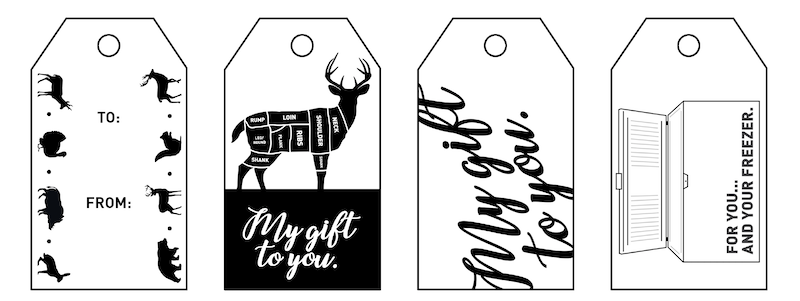It’s fun to develop unique holiday traditions. When I lived in Alaska and flew home for Christmas, my parents knew I’d arrive with a suitcase and cooler filled with salmon. I loved watching family and friends marvel at the vibrant red fillets. They lived landlocked lives, so wild-caught salmon was expensive, making my annual or semiannual gifts a rare treat.
I loved giving my loved ones such unique gifts. Besides providing delicious, healthy meals, my salmon gave them a taste of my new life. As we shared those meals, I’d share stories of epic days, bear encounters, and new adventures of my life in Alaska.
Gifts of celebratory food are an ancient, widespread tradition. Most hunters and anglers enjoy sharing their bounty. If you plan such gifts of wild game this holiday season, follow these tips to ensure your generosity is appreciated.
While hunting in Alaska, my cooler included caribou backstraps, moose burgers, and black bear breakfast sausages. I was raised on elk, deer and antelope, so my family was eager to try some new species. My nonhunting friends, however, were pickier.
As with any gift, it’s important to consider the recipient. Not everyone eats wild game. Nor does everyone appreciate such gifts, given their ethics, dietary restrictions, or taste preferences. If you’re unsure whether someone appreciates wild meat, ask those who know them. You could also invite the person to dinner before the holidays, and then serve some wild game to see what they think.
Wild game is meant to be eaten, so you want to share it in ways that ensure it won’t spoil. Many hunters share jerky, sausage, meat sticks and canned meat because these treats don’t need to be frozen or refrigerated. They’re also easy to wrap and place under the tree. Just make sure a dog won’t get them.
But don’t skip making gifts of tasty tenderloins or packaged burger just because they’re more complicated to keep. If you plan to make gifts of frozen meat, don’t surprise anyone, and make sure your gifts won’t sit out too long. You don’t have to reveal its contents, but give them a heads-up to put your gifts in the freezer. Depending on the amount you’re giving away, check to make sure the recipient has room in the freezer.
The 2020 holiday season is reshaping traditions. Instead of large family gatherings, many celebrations will be small. And instead of sending loved ones home with gifts, you’ll likely ship packages to their homes. Before shipping venison or other wild game, check the shipping regulations and rules for each destination. In many cases you can’t ship meat internationally.
If you plan to ship frozen meat, consider dry ice to keep it fresh. Most shipping companies offer information on their websites for packaging frozen foods so they don’t spoil or create a mess. Tell the shipper the package contains meat. Many of them have freezers for storing such packages. You should also use an expedited service, which is more expensive.

Your ATA created free, printable gift tags for wild game. Photo Credit: ATA
To be a holiday hero, add some extras to your gift to make it special. Give them a variety of cuts or meat from various game. Add a wild-game cookbook and flag your favorite recipes. Consider adding some spices, or assemble a gift basket filled with wild game and extras to create a holiday favorite.
Making gifts of wild game involves more than meals. It invites others to join in a special part of your hunt. It also doesn’t need to be restricted to the holidays. It’s appropriate anytime when given to those who appreciate the gesture.
After all, it’s a personal, thoughtful way to provide healthy meals while opening the door to deep connections and storytelling. It can become a tradition everyone savors every year.